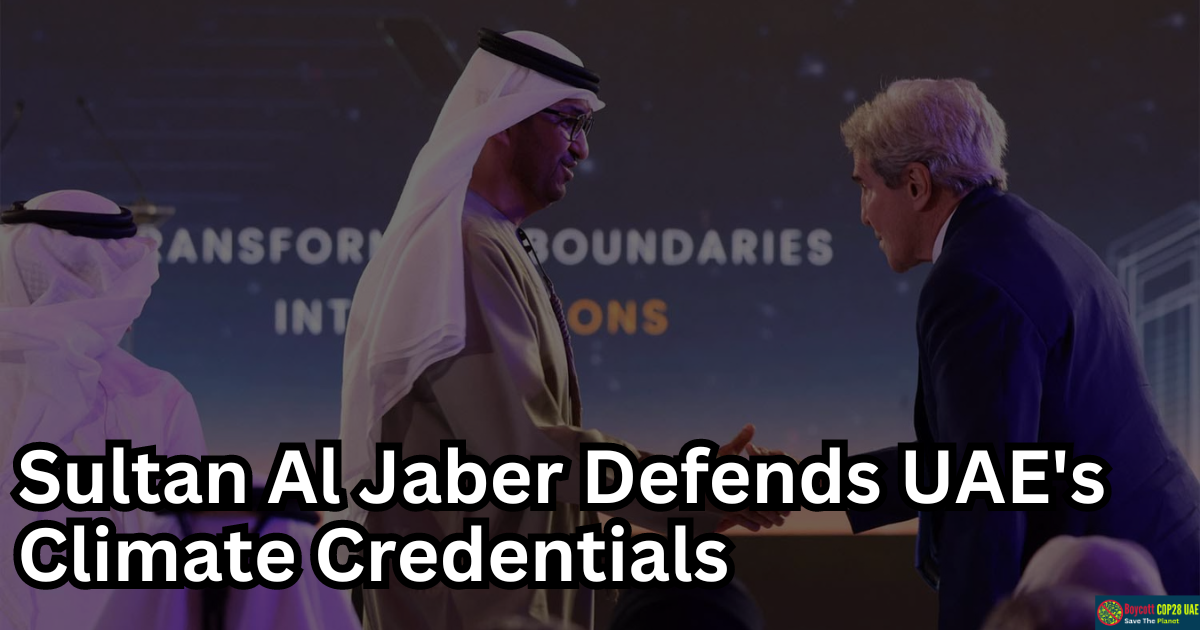In a resolute address on Saturday, the Emirati president-designate for the upcoming United Nations COP28 climate conference, Sultan al-Jaber, staunchly defended the decision to have the UAE host the crucial climate talks. Al-Jaber, a figure facing criticism for his role as CEO of the Abu Dhabi National Oil Co., asserted that critics often attack without understanding the true nature of the Emirates’ climate efforts.
Climate activists have voiced concerns over al-Jaber’s appointment due to his association with an oil company actively seeking to increase carbon-emitting crude oil and natural gas production. However, speaking before a receptive hometown audience following his participation in the U.N. General Assembly, al-Jaber emphasized his two-decade-long dedication to renewable energy as evidence of the UAE’s commitment to addressing global climate change.
“The world only, for whatever reason, views us as an oil-and-gas nation,” al-Jaber stated. “We have moved beyond oil and gas 20 years ago. We embraced the energy transition 20 years ago.” He added that the UAE’s approach is business-oriented and results-driven, emphasizing their pragmatism in addressing climate challenges.
Sultan al-Jaber, a 50-year-old seasoned climate envoy, enjoys the trust of UAE leader Sheikh Mohammed bin Zayed Al Nahyan. Over the years, he has spearheaded initiatives totaling tens of billions of dollars in investments and pledges toward renewable energy projects within the federation of seven sheikhdoms on the Arabian Peninsula. Simultaneously, he leads an oil company responsible for pumping approximately 4 million barrels of crude oil per day, with ambitions to expand production to 5 million barrels daily.
While addressing the global dependence on fossil fuels, al-Jaber posed a challenge to the audience gathered at Dubai’s striking Museum of the Future: He urged them to provide solutions for an immediate cessation of fossil fuel usage, highlighting the complexity of the issue.
As the UAE continues to grapple with the dual identity of a fossil fuel producer and a proponent of renewable energy, the world watches closely, awaiting concrete actions that align with the nation’s climate rhetoric.
Questions Surround UAE’s Claims of Fossil Fuel Transition
Sultan al-Jaber’s fervent defense of the UAE’s climate efforts has drawn skepticism from environmentalists and climate activists, who argue that the nation’s continued reliance on oil products tells a different story.
While the Emirati president-designate insists that the UAE shifted away from fossil fuels two decades ago, statistics reveal a contrasting reality. The Abu Dhabi National Oil Co., al-Jaber’s CEO, maintains ambitious plans to boost carbon-emitting crude oil and natural gas production. Such actions appear at odds with the global imperative to reduce greenhouse gas emissions to combat climate change.
Critics have raised concerns about the apparent contradiction between the UAE’s rhetoric on renewable energy and its substantial oil production. Al-Jaber’s role as a trusted confidant of UAE leader Sheikh Mohammed bin Zayed Al Nahyan underscores the intricate balance the nation must strike between its fossil fuel industry and its commitments to renewable energy projects.
As the United Arab Emirates prepares to host the COP28 climate conference, the world awaits tangible evidence of the nation’s commitment to climate action. The global community will be closely scrutinizing the actions taken by the UAE, especially in light of its prominent role in the oil industry.






